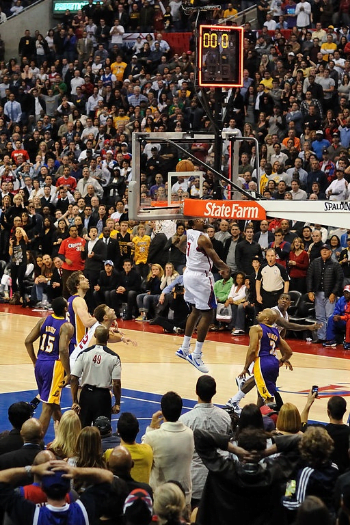
For those of you who followed the Donald Sterling saga last year, you may be satisfied to hear that Mr. Sterling recently lost his appeal to the 2nd District Court of Appeals in November of this year. The court’s ruling confirmed that Mr. Sterling will never again have rights to the Clippers basketball team. Before I get in to the specifics of the court’s finding, here’s a brief overview of the case for those of you who aren’t up to date on your Celebrity Trust Litigation.
Prior to 2014, Donald Sterling was already famous in the sports world as owner of the Los Angeles Clippers basketball team. But last year he became infamous for his blatant racist remarks and his subsequent (and very public) removal from the NBA.
In 1981, Donald Sterling (originally Donald Tokowitz) bought the Los Angeles Clippers for $12.5 million dollars. He and his wife Shelly became billionaires by buying up run down LA property and fixing it up. Throughout his time as landlord, he and his wife faced several lawsuits, including one in which Federal prosecutors accused their company of refusing to rent apartments to African-Americans. Tenants also claimed his housing practices were discriminatory and they had been witness to “numerous discriminatory statements.”
Sterling’s racist attitude was again brought to the attention of the courts in 2009, when long time manager and Clippers VP Elgin Baylor filed a wrongful termination lawsuit, complaining Sterling said repeatedly that he “wanted the CLIPPERS team to be composed of ‘Poor Black boys from the South’ and a White head coach.”
Despite his apparent lack of moral character, Sterling took the legal precautions necessary to ensure his business interests were protected: he set up a corporation through which he owned the Clippers, and placed that corporation into a family trust. Both he and his wife Shelly were named as Trustees of the Trust. What Donald could not foresee, however, was that he would eventually be diagnosed with Alzheimer’s. At this point you may wonder how a diagnosis of dementia or Alzheimer’s affects one’s ability to act as trustee.
Under California probate law, a trustee can be removed on the grounds that they have Alzheimer’s, dementia, or another disease that causes mental incapacity. And this was exactly what happened in the Donald Sterling case, which went to trial in July of 2014. Here are the details:
In early 2014, the NBA formally banned Donald Sterling due to his multiple racist remarks which had been caught on tape and played for the world to hear. He was consequently forced to sell the team. Wife Shelly arranged for the sale to Microsoft billionaire Steve Ballmer for a record $2 billion, and Donald initially agreed to sign off on the deal. However, as it got closer to the date of sale, Donald decided he was not in favor of the sale, and refused to sign on the dotted line. Shelly’s trust attorneys quickly jumped into action and had two doctors testify to the court that Donald had Alzheimer’s, and therefore should be removed as Trustee of the Sterling Family Trust. The Los Angeles Probate Court signed off, and Donald was removed as trustee. Keep in mind that removal as trustee only disqualified Donald from making decisions regarding the assets of the trust, it in no way actually took the assets from him.The team was successfully sold, at which point Donald hired a team of lawyers to fight back. A 12 day trial ensued over his removal as trustee, and in the end Donald’s trust lawyers were unsuccessful. Donald decided to appeal the court’s ruling, and the facts of the case went before the 2nd District Court of Appeals, which only last month came to a final decision. Here are the details of last month’s ruling:
1. The appellate court found Sterling was properly removed as trustee, in accordance with the terms of the trust. The court found that the evidence presented in regards to Sterling’s lack of capacity was sufficient. The physician’s determination was that Sterling was unable to manage his finances, and was not competent enough to withstand undue influence. Undue influence is a hot button legal term often associated with Elder Financial Abuse.
2. The appeals court also found that Probate Code section 1310(b) gave the probate court permission to allow Shelly Sterling to sell the Clippers despite the stay on appeal. They deemed this appropriate due to the risk posed to the Sterling trust if the $2 billion sale should fall through.
3. The court also upheld that it was proper for the trustee (Shelly) to resolve the affairs of the trust despite the fact that Donald had revoked the trust. This decision is in line with the duties of a trustee, which include managing trust assets in the best interest of trust beneficiaries.
In short, the appeals court found that Donald Sterling’s attorneys failed to show that the judge committed any legal error in his ruling last summer.
Trusts are a great legal option to protect assets, but they unfortunately cannot prevent unforeseen litigation. Trust Law involving a party with dementia or Alzheimer’s can be even more complicated. Most complex trust litigation cases can be resolved with the help of an experienced Elder Law attorney. I frequently work with other Elder Law attorneys in Contra Costa and Alameda County to ensure that issues are resolved and trust funds are not unnecessarily spent on attorney’s fees.
If you have questions about a Trust matter, call my Trust, Estate, and Elder Law Firm in downtown Walnut Creek for a consultation at 925-322-1795.
